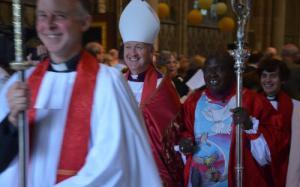I have been a little occupied recently. I legally became the Bishop of Leeds on Sunday in a legal ceremony (called Confirmation of Election) at York Minster. We did the legal preliminaries before the big event, then concluded during the service attended by nearly 3,000 people. This was the first event at which all parts of the new diocese came together to celebrate a new beginning – and it was, thanks to the wonderful Minster staff – a great event: four cathedral choirs, a brass ensemble, an excellent church worship band, visitors from home and abroad, and full of color. My friend and German counterpart as co-Chair of the Meissen Commission, Bischof Professor Friedrich Weber, did a reading – as did Professor Michael Clarke, chair of the Dioceses Commission which kicked off the whole transformation business in the first place.

What didn't come over in the service was the enormous amount of sheer hard work put in to the transition towards the creation of the new diocese by an army of brilliant people. The closer you get to the detail of the processes we are going through and the more you realize just how complex and demanding the whole business is. I would want to pay tribute to the unseen shapers of the infrastructure upon which we shall build the new diocese, orientated by a fresh and creative articulation of our vision. Watch this space, but hats off to the 'workers'.
While all this has been occupying my mind and time, some big questions have arisen in the world around us. I haven't had time or space to follow all the detail, but, sitting on a train to London, the following questions come to mind:
1. What are the 'British values' that Michael Gove wants taught in our schools? In what way are they 'British'? Who decides what is a 'British value'? (As I keep proposing, 'Britishness' is something we keep creating and not merely something we inherit from a real or imagined glorious past.)
2. Who is driving strategy for the British Humanist Association? To ride on the back of the 'Trojan horse' to attack faith schools seems particularly inept and disingenuous when all the schools involved are state schools. Has someone missed something here – or is this just another case of prejudice leading to narrow propaganda?
3. When did 'diversity' become a virtue as opposed to a phenomenon? The word describes a reality, but it has become elevated to a virtue or value that has to be uncritically revered. As Mark Easton points out, one man's diversity is another woman's extremism. So, what are the limits of diversity, who sets them, and according to which criteria?
4. Does Ofsted retain any credibility? Either they were inept when they last did their work on these schools, or they are inept now. How are we to judge the judgements of any Ofsted inspections – a question asked well before the latest credibility crisis? (This is tied in with the question of centralisation and accountability: a political dogma that proclaims decentralisation and the virtue of the small state has somehow managed to remove local accountability and replace it with centralised accountability to the Secretary of State. And nobody laughed…)
5. Who allows Sepp Blatter to run world football as a personal fiefdom, refusing even to disclose his salary? And why does the rest of the footballing world collude in this travesty?
That's all.

